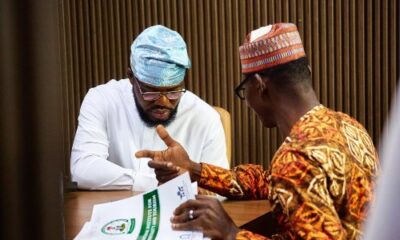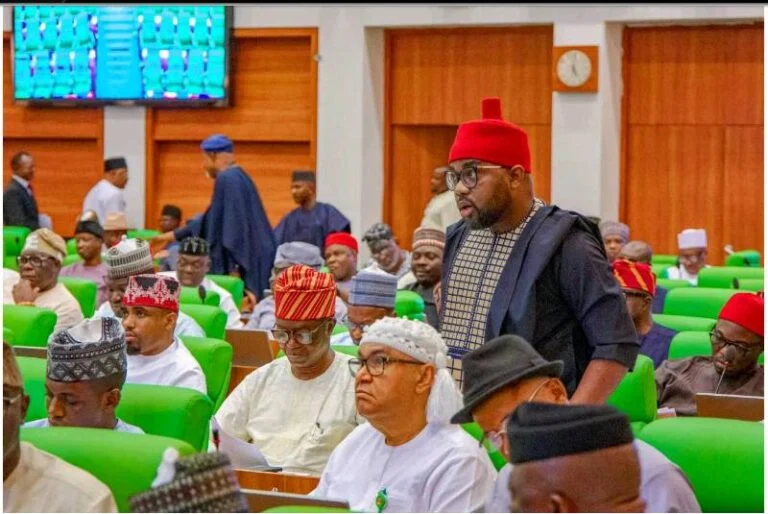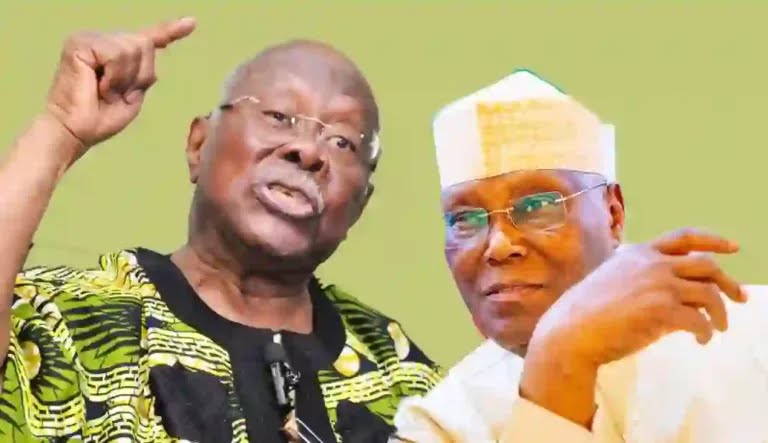Nobel laureate, Prof. Wole Soyinka, on Wednesday accused President Muhammadu Buhari of treating killer herdsmen with kid gloves.
Soyinka said this on the heels of the killing of about 200 persons by herdsmen in two local government areas of Plateau State.
In a statement titled: “On Demand: A language of non-capitulation, non-appeasement,” Soyinka urged President Buhari to make killer herdsmen pay for their crimes to send a strong warning that his administration would not tolerate forceful land seizure anywhere in Nigeria.
The statement reads in full:
Land grab will be reversed!” This is the first governance pronouncement, the first pertinent proclamation from the presidency since the herdsmen national affliction began. Catastrophically belated, it has finally emerged from the constricted throat of a government that seemed unaware that its very corporate existence was under strangulation.
Many, in this nation, have had bitter cause to conclude that governance had indeed expired, its elected head in a trance. It is not that long ago when I demanded that this declaration of intent – the reversal of land expropriation through mass murder – be made, and that the triumphalist beneficiaries of such obscene occupation agenda be openly given a deadline to self-evacuate, or be forcefully evicted.
However, a commitment is now firmly in hand, but enforcement is all, so is the tempo of enforcement. Statements of outrage, humane sentiment, empathy, even visitations to afflicted areas are natural expectations from government, and perfectly in order. They are essential indications of concern and solidarity, even of admissions of lapses. They offer glimmerings of eventual measures of equity and restitution – of which we must never lose sight – else, community sinks into despair, or enters the interminable spiral of reprisals.
Visible pragmatic measures additionally assist in bolstering the optimism of victims, enable them to feel that they have not been abandoned. Such are the relocation of security commands to vulnerable zones, deployment of Special Forces and attack helicopters etc. etc. – yes – all these are mandatory measures, it is their absence that constitute unpardonable negligence. Long term propositions, such as establishment of ranches, restriction of cattle movements, cultivation of fast growth grasses and so on – they all indicate far-sighted planning. They deserve approbation, but they are not exclusively remedial.
Certain unconscionable events have taken place, and cannot be ignored. Entire communities have been erased from the national landscape. Thousands of family units are in mourning, survivors scarred and traumatised beyond measure. Famine looms in many areas, even in those lodged in acknowledged bread baskets of the nation.
Impunity, gleeful and prideful impunity substitutes for decent self-distancing from once unthinkable crimes – let us not even speak of expressions of remorse and human empathy. The instigators, increasingly fingered as directors of human carnage are strutting around, defiant, justifying the unspeakable, daring a nation – there is no other word for it – daring governments and nation to attempt to reverse their categorisation of communities as culpable, sentenced and deserving of some of the most revolting, onslaughts of ethnic cleansing that this nation has ever undergone.
Once, when we spoke of internal colonialism, we referred merely to the military seizure of a people’s political will. Today, that phrase has taken on a bruising physicality – seizures of a people’s land patrimony and the abrogation of their centuries old resource of material survival.
What is the ultimate destination of these new imperators? The answer is unambiguous: Land. The seizure of land, either for seasonal grazing, for the lordly passage of cattle, or for permanent settlement. The rights of passage, no matter the cost. This is what makes noteworthy this new language of objective appraisal, one that is indicative of remedial action.
When President Buhari complains – see today’s (June 27) media report, that it is unjust for the public to accuse him of being silent on the killer herdsmen, that is exactly to what they referred – the erstwhile language of complacency and accommodativeness in the face of unmerited brutalisation. Buhari had yet to speak in the language that these murdering herdsmen understand – simply, that forceful seizure of land will not be tolerated in any part of a federation under his governance. That the temporary acquisition of weapons of mass elimination by any bunch of psychopaths and anachronistic feudal mentality will not translate into subjugation of a people and a savaging of their communities; that any such gains are illusory and temporary and will be reversed. The plaint of ‘injustice’ is a misjudgment of the injustice done directly to the victims, and vicariously to the rest of us who turn to the news with dread every day, wondering what new stomach-churning accounts of the gory agenda on their humanity will replace the normal concourse of humanity.
That language, A to Z – Adamawa to Zamfara – symbolises and encompasses the Nigerian alphabet of a new language, and it is anyone’s guess whose lettering will next scorch the minds even of far distanced strangers. And, if I may confess a personal note, we are not all outsiders to this geography of collective being, and its alphabet. B – for Barkin Ladi – for instance, a serene, hospitable town was one of the favourite way stops of my research days across the nation at the very time that the nation took her early faltering steps into independence – in the early sixties. Distanced by time, Barkin Ladi nevertheless remains part of a personal, fond, formative family. Is it that same Barkin Ladi that has been put to the torch after the slaughter of her people? My people? If I visit Barkin Ladi tomorrow, will I recognise any landmark of my knowledge seeking trajectory?
Quickly, let it be stressed, this sense of violation is anything but personal. Till now, the language of governance has been constructed from the mangled alphabetism of the Inspector-General of Police (IGP) who earlier dismissed creeping genocide as neighbourhood clashes. It has been thrust into the curriculum by a Minister of Defence, Mansur Mohammed Dan-Ali – now minister of an undeclared adult educational re-orientation – who, again and again, savages already ravaged sensibilities with his distortion of a national catastrophe as a deserving consequence of a state’s legislative answer to an already manifested outrage. If ever an individual qualified to be the guinea-pig for testing the outrageous hate bill speech contemplated by our legislators, it is the unedifying pronoucements of that minister of Defence, who continues to defend the indefensible through his arrogant, provocative dismissals of an agenda of ethnic cleansing, dehumanising the victims anew, and camouflaging the failure of government by his gratuitous blame-passing.
The language of the Dan-Ali, a Brig.-Gen. of the Nigerian Armed Forces, is a language that is now being contradicted by the meaning of “Land grabbing shall be reversed”. So, which is the true heart speak of this government? That question is now catapulted to the fore even by this long avoided, and pro-active newspeak of government. The answer will be in the act, and its tempo. It will be judged also in the continued retention of such an unreformable enemy of democracy, sense and justice, one who gives joy to proven killers, who flaunts temerity to order state governments to abrogate their own rights to enact laws for the protection of their citizens!
The urgency is oppressive. It was revealed to me only last week that the former Secretary to the Government of the Federation, Olu Falae, whose ordeal of being kidnapped by these same marauders is still fresh in the nation’s mind, is still under siege by the same forces. Neither he, nor his workers can routinely attend to Falae’s farms, being under constant harassment by herdsmen. How could this happen, be happening, to us after the learning spell of the yet unfinished business of Boko Haram? In these matters, need I stress? – timing is all, and that timing translates in that ancient language of – ‘a stitch in time’! An aggressor who sniffs, however faintly, the permissive air of immunity, is near totally beyond recall. Only the stern language of reprimand, manifested in act, will deter him. The price of desultoriness is serial forfeiture of more than lives, hence the agony into which Nigerians have been repeatedly plunged. The leaders of Myetti Allah are self-vaunting instigators in the nation’s herder colonisation. Going by their utterances alone, their ultimatum to state governors to reverse their grazing laws or else – it is clearly not cows that need to be fenced, but Myetti to be caged. We are speaking of a recent human body count of close to two hundred, and the Myetti gang’s retort that three hundred of their cows have been rustled. Do I need to repeat here my earlier commentary on the Myetti and its allies, an assessment daily reinforced by that demonic breed. I think it is necessary, since the same language is being promoted by the minister of Defence on behalf of his government.
“Repeal this law, they demand, we shall settle for nothing less! They defy such laws, then proceed to demonise the affected state governments by twisting the order of events: the killing happens, they claim, because of what was put in place – in response to killing! Did you ever encounter a more cynical rendition of the sequence of cause-and-effect? A nation has been placed on the defensive…… I am not aware that that Myetti demagogue, the upside-down historian of first settlers and the antiquated logic of conquest, that illiterate mouther so filled with his sense of power and confidence of impunity – I am not aware that he has ever been called for questioning.”
Mr. President, do you know what I strongly believe? This recent planned massacre had a numerical target. The latest killing spree is the formal annunciation of a new law. From now on, for every missing, maimed, even legally seized cow – perhaps for trespassing and damage – one human being shall die, and commensurate land shall be forfeited. Make no mistake, that is the message!
Berom or Ondo, Tiv or Efik. Egba or Igalla – it makes no difference – this is the language, and if your government does not understand it yet, we, whose field is language, both spoken and symbolic, must decode it for you. Myetti Allah has spoken. It has inscribed this new law across the landscape in bloody lettering.
Add to this, a study in complementarity: the five young men recently sentenced to death by a High court of sorts in Zamfara – for allegedly killing a herdsman. We do not condone murder in any cause – let that be stated clearly – neither in any cause nor by anyone, and will always uphold the course of justice which, we equally insist, must remain transparent and impartial. The agitating question then is this: since this rampage began, has even one herdsman been brought up before those same courts on a charge of murder, much less sentenced to death at such lightning speed? Shall we wake up and find that they have been hanged? Yet, Zamfara has lost hundreds to the homicidal orgy of these same herdsmen. There is a skewed application of justiciable proceeding here that baffles many, this writer among them.
And now, we learn that the survivors of overwhelmed, fireballed communities, and their apprehensive neighbours, are being deprived of even their paltry defensive weapons by army units sent to zones of carnage. When I visited the governor of Benue State some weeks ago, he bitterly lamented that security agencies have even ordered his communities to surrender even the very machetes of routine use in farming. The logic of this eludes one. The JTF – the so-called Junior Task Force, made up of civilians – has been working hand in hand with the Nigerian army in the liberation of communities overrun by Boko Haram, complementing overstretched military capabilities. Their operations have gone beyond even self-defence and include aggressive pursuit of their aggressors. Like the army, they have bravely taken losses. So, why are these victims of cattle overlords not encouraged, even assisted to defend themselves? Community policing is a basic right of society and, where needed with whatever weaponry is available to them‘ The community knows itself, the members know one another, and all know their terrain. Could the military save Barkin Ladi? More pertinently, can the military protect every village in the fast-expanding territory of cattlemen terror? When can Olu Falae resume the simple, ruminant existence of a former civil servant who has opted for an imagined conflict-free existence?
The Danjuma thesis – defend yourselves! – is neither new nor strange, it is simply a restatement of the logicality of human response in the face of aggression, and one is grateful for the authoritativeness of military experience that is behind it, and a trained on-the-spot capability for assessment from within. Yes, the land-grab must be reversed, but the restored will still require to be defended, and aggressors also served a lasting lesson both from the manifested responsibility of governance, and the resistant will of the people.
Accounting for crimes is also part of that responsibility, and such criminality must not be seen to be rewarded through idealistic solutions that paper over crimes against humanity. For that is the present actuality. Crimes against our humanity have been committed, and restitution must be made. Nothing less will restore confidence in a government, and reassure the people of its integrity, its commitment to equity in internal relationships and the rightful custodianship of ancient resources.
It is a time of far-reaching, yet immediate decisions. The nation is dying. The time for false pride is over. If this nation lacks the necessary technical resources, then, there remains only one blameless, overdue recourse: “Get Help, Mr. President!”

 BIG STORY3 days ago
BIG STORY3 days ago
 BIG STORY3 days ago
BIG STORY3 days ago
 BIG STORY2 days ago
BIG STORY2 days ago
 BIG STORY2 days ago
BIG STORY2 days ago
 BIG STORY3 days ago
BIG STORY3 days ago
 BIG STORY3 days ago
BIG STORY3 days ago
 BIG STORY4 days ago
BIG STORY4 days ago
 BIG STORY5 days ago
BIG STORY5 days ago




















